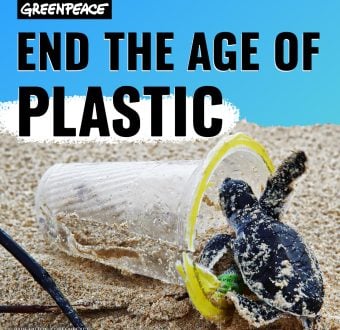Last weekend, our oceans and planet scored an incredible victory when, after years of negotiations, nations finally agreed on a Global Oceans Treaty, the biggest conservation agreement in the history of the world. Between now and the end of 2024, we have a similar opportunity to secure a global plastics treaty, which could significantly reduce the amount of plastic being produced and polluting our oceans and communities.
The first round of negotiations for the plastics treaty started last November and the next one will be in Paris at the end of May. The US released its current position on the plastics treaty and, disappointingly, it is pretty underwhelming.
Countries like New Zealand and Peru are supportive of an ambitious agreement that cuts plastic production, while countries like Japan, the United States, and Saudi Arabia do not. If significant cuts to plastic production are not embedded in the final treaty, the treaty will never solve the massive plastic crisis that we are currently facing.
The US currently supports voluntary “national action plans” that will let individual countries decide how to reduce the amount of plastic they are producing and using. In the climate movement, we’ve seen similar voluntary commitments, such as the Paris Climate Agreement, not actually work for reducing the amount of greenhouse gasses we are pumping into the atmosphere. The plastic crisis is rapidly affecting human health, oceans, and our climate and we don’t have time to waste on voluntary measures. We need the Biden administration to support an ambitious and binding cap on plastic production, with a phase down of the most harmful single-use plastics first. Countries should be incentivized to meet their commitments and if they do not, they should be penalized.
The US position on the treaty also focuses heavily on plastics recycling and investing in recycling infrastructure. However in 2021, a mere 5% of plastics were actually recycled in the US. Recycling will never fix the plastic waste crisis and touting technologies like “chemical” and “advanced” recycling (which are industry speak for “plastic burning”) are distractions from the root cause of this problem: there is simply too much plastic being made. Instead, we need the US to focus on reduction, widespread systems of refill and reuse, and package-free solutions.

As one of the world’s largest producers and consumers of plastics, the US has a responsibility to take meaningful action to reduce its plastic footprint. We need the Biden administration to listen to the people – not the big consumer brands nor the petrochemical industry – and to support an ambitious, binding plastics treaty that will:
- Cap and phase down virgin plastic production
- Immediately eliminate the most problematic and avoidable single-use plastics
- Follow the zero-waste hierarchy by focusing on reduction and reuse before recycling
- Create a fair and equitable transition so that wealthier countries and polluters have to pay for the mess they disproportionately created
Join Greenpeace USA in calling on Monica Medina, the top State Department official working on the treaty, and the Biden administration to support a strong global plastics treaty by signing our petition here.



